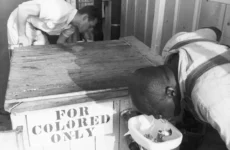Perhaps the great Will Rogers said it best: “If there are no dogs in Heaven, then when I die I want to go where they went.”
All of us who know and love dogs understand what the great man was saying because I’m sure most of us feel exactly the same way about our best friend. And that’s exactly why there is much pain in the heart of a 68-year-old Niagara Falls man these days who is still grieving over the loss of his best friend last summer in a tale almost too painful to relate. But he wants his story told in the hopes that somehow it will help other people, so here it is.
Francisco Fernandez has a wife and grown children and until last June, he had a dog named Onyx, a mixed breed that he regarded as a member of the family, as do most of us who are privileged to have a four-legged friend at our side.
This sad story began last June 25, according to Francisco, when Onyx began having trouble standing up and walking although he did not appear to be in pain.
Unfortunately, it was a Saturday, and Francisco’s regular veterinary hospital was closed so he took Onyx to the Grand Island Small Animal Clinic for an examination and treatment.
After a long wait, the dog was finally examined and Francisco was told the dog appeared to have a problem in the neck area and would require treatment.
“I was presented the estimate that included two days in the hospital for observation, X-rays, and lab work,” Francisco wrote. “The cost for the diagnostic tools was $2,000. I really could not pay that amount for diagnostics only, but finally we agreed on a testing procedure that was $922, including X-rays and lab work.”
Francisco needed to pay first before his dog would be treated, and with prescriptions the bill came to $1,058. But even after paying the money, there was no diagnosis and he was told to bring Onyx to a radiologist or to Rochester to get an MRI.
It was a terrible experience, Francisco told the receptionist at the clinic who insisted that they all loved pets at the clinic.
Lab results were quickly sent to Francisco’s regular veterinary clinic but he had to go back to Grand Island to have the X-rays sent as well and it was then he got a report from his own vet that Onyx was not going to make it. For the record, the Grand Island Small Animal Hospital would not answer questions about Onyx’s treatment, saying they were restricted because of the involvement of the Niagara County Health Department, which we will get to later.
The Health Dept. entered the picture two days after Onyx’s visit to the Grand Island clinic, when a Health Dept. employee visited Francisco’s house, claiming he had received a report the dog had bitten someone, apparently at the Grand Island clinic, and to “verify both that the dog was still alive and had a vaccination record up to date.”
The next day, Francisco received a letter from the Niagara County Health Dept. that cited a state sanitary code and said the dog had to be put under confinement for 10 days.
Francisco said with a possible cancer diagnosis and the likelihood he would have to be put down, he did not want his dog confined. After several back and forth calls, a supervisor at the Health Dept. called Francisco’s veterinarian and told her that if the dog had to be put down, they had to give the body to the Health Dept. or, as was first demanded, bring the dog in for confinement.
As you can imagine, Francisco by now was a wreck, seeing his beloved pet in pain and fighting the confinement so that the dog could be put to sleep on the family’s terms, not kept alive when he was no threat to anyone in his condition, or, as Francisco insists, ever.
Francisco argues that the Health Dept. was wrong, that there was no suspicion of rabies with his dog and therefore no reason for confinement and that with his body ravaged with cancer, the dog couldn’t even stand up and was no threat to bite anyone.
Francisco was very upset that the Health Dept. wanted to confine his dog even though there was no sign of rabies, only the cancer that was killing him. In the end, there were only two choices for the poor man, the confinement or have the dog put down and give the body to the Health Dept. so they could examine his head (decapitation) after death.
In the end, Onyx was put to sleep on July 5 by the family after eating a special meal although the battle with the clinic and the Health Dept. had taken its toll on the family.
“That is the reason I am coming forward,” says Francisco. He has sent a letter to the Health Dept. asking for administrative discipline for the supervisor that he dealt with and denouncing the entire process he was forced to endure at the end of his dog’s life.
Francisco, a 68-year-old man “unarmed, and not precisely strong,” felt he had been bullied by the bureaucrats while he was just fighting for “correctness” for his dog and family.
To this day, months later, Francisco is still hurting over the ordeal he went through while losing his best friend, still trying to understand why he had to endure the bureaucratic bullying as he fought for a dignified end for the dog he loved.
The Health Dept. says they were just enforcing the law. But does the law say to push around an old man and make demands about his dog’s final hours that seem inconsistent with the condition of the dog who was dying of cancer and no threat to anyone? To demand his head on a plate from an old man already bent over with grief at the loss of his best friend?
There should have been a better way. Francisco loved his best friend and fought to protect him at the end. Is that so wrong? Shouldn’t the bureaucrats been a little more compassionate? Don’t they know that, as someone once said, “there is nothing truer in this world than the love of a good dog.” Francisco knows that and so do I and many others who would stand up with all they had for their best friend.
It is a sad tale, to be sure, but maybe there is something to be learned, as Francisco hopes. Maybe this tale will give the bureaucrats and others pause to remember that while laws need to be enforced, so does humanity, and in this breakneck world that we live in, there must always be a place for compassion and caring.
See you in Heaven, Onyx, with all the wonderful dogs that have been man’s best friend for so long. Will Rogers is right. If there are no dogs in Heaven, I want to go where they went.





















